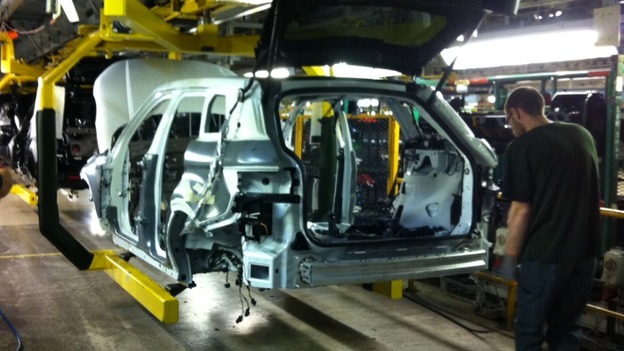Jaguar Land Rover (JLR) has begun working around the clock at its Halewood plant in response to increasing demand.
This decision by the luxury car manufacturer also coincides with the company’s launch of Land Rover’s new Freelander 2 model. The news was welcomed by the region, as this move has led to the creation of 1,000 new posts at the Halewood factory.
It has even caused some of Jaguar Land Rover’s suppliers to follow suit and they have also commenced 24 hour production to support the operation. One of the outcomes of this is that through the supply chain, thousands of new jobs will be created and this is estimated to amount to approximately £3bn worth of contracts, which is great news for employment in the area.
Although the Halewood factory has been running for 50 years, employees have never worked around the clock before now. The primary reason for this move is to keep up with worldwide demand for the Range Rover Evoque model, which has become extremely popular.
Production will be split into three shifts over the 24 hour period. Richard Else, operations director at the Halewood factory is confident that 24 hour production will enable JLR to cut waiting times for their customers considerably.
He introduced a trial night shift back in July, so that the new shift pattern got off to a good start.
Vince Cable, Business Secretary welcomed the news, as indeed did the Government in general. The double-dip recession has been the cause of ongoing concern, so growth in the British car manufacturing industry is invariably good news. It is hoped that developments at the Halewood plant will be a key driver when it comes to economic recovery and that it might signal better times ahead for the UK’s economic outlook.
Jaguar Land Rover export in excess of 75% of cars manufactured at their Halewood plant, and this is worth about £2 billion per year.
Government policymakers are clearly getting it right, because GM are following suit, and they have announced plans to invest further in its site at Ellesmere Port, Cheshire.
Launched in July 2011, the Range Rover Evoque has become very popular. So far, the car has been sold into over 170 markets and nearly 90,000 vehicles have been purchased by consumers. The highest proportion of demand has come from China, the second largest economy in the world, and nearly 12,000 Evoques have been sold there to date.
Halewood’s workforce has increased three-fold in the last three years. Recruiting new staff for the new 24 hour production has pushed the total number of employees at the plant up to a total of 4,500. The luxury car manufacturer is keen to ensure that staff are trained thoroughly, with recruits receiving as much as a year’s training in some cases. For production operators, this could lead to an Intermediate Apprenticeship. JLR sees investing in employees and developing skills as being of primary importance.
Jaguar Land Rover was bought by Indian company Tata Motors for around £1.5billion from the Ford Motor Co back in 2008. Tata is now the largest employer in the UK’s automotive industry.
JLR disclosed plans to expand its production facilities for the Range Rover Evoque in April this year following a record £1.5billion in profits before tax. This was a marked improvement upon £1.1billion in the previous year. Emerging markets such as China have contributed significantly to this with sales rising to 37%.
Recently, the Land Rover brand has been the major driver behind JLR’s success, and the company is currently working on developing new models for the Jaguar brand. This should drive Jaguar sales and profits even further.

